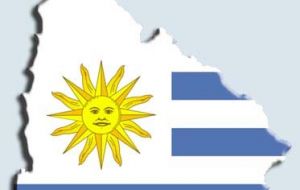MercoPress. South Atlantic News Agency
Uruguay confident of weathering financial crisis, says FT

An optimistic overview of Uruguay's economic prospects for 2009 and 2010 was displayed by the country's Economy minister Alvaro García and Central Bank president Mario Bergara during an interview with Jude Webber from the Financial Times (November 28).
Optimism is based on Uruguay's strong financial system, manageable debt, floating currency and less exposure to its neighbors as happened in 2002. Besides the fact the economy has been growing sustainedly for the last five years and could end 2008 with a double digit expansion. Massive investments in the pulp and forestry industry also supports this view. However the private sector and independent economists are more cautious given the global situation and the fact 2009 is election year. One economist suggests Uruguay should ensure a 2 billion US dollars stand by to anticipate any surprises. Follows the article:There are few safe havens in the global financial crisis but with investor interest still alive, record exports and a healthy financial system, tiny Uruguay is confident it can weather the storm, even if another crisis erupts in neighboring Argentina. Uruguay's financial system toppled in a domino-effect in 2002 after Argentina's $95bn default and devaluation sparked a run on Argentine deposits in Uruguayan banks. New fears that South America's second biggest economy could be heading for another debt crisis have sent shivers down Uruguay's spine, especially as the world lurches towards recession and prices for Uruguay's valuable commodities exports fall. But officials say Uruguay has slashed dependence on its larger neighbor, courted investors, bounced back with six years of growth that will hit a record this year and prefinanced its debt until 2010. It even overtook Argentina in one of its most emblematic exports, beef. "The situation is completely different to 2002," Economy Minister Alvaro García told the FT, noting that Uruguay now has manageable debt and a floating peso as well as less than half the exposure to Argentina in terms of trade and foreign currency deposits as it did then. Overall, "Uruguay is far better prepared and less vulnerable than a few years ago and we're optimistic that we face this [international financial] crisis with much lower costs than before," said Mario Bergara, Uruguay's newly-appointed central bank president. Ernesto Talvi, an economist at Montevideo-based think-tank Ceres agreed Uruguay has a very liquid banking system with low credit risks, and has stuck to orthodox policies despite having a leftist government. But he sees recession in major world economies, a painful slowdown among Uruguay's regional trading partners, lower commodities prices and the combination of costlier and less available credit spelling "strong recessionary pressures in 2009-10" for Uruguay. Uruguay posted first-half growth of 13.1 per cent and expects to raise its 9.5 per cent full-year forecast, amid expectations by private economists of 2008 growth of around 11 per cent, Mr García said. For 2009, the official estimate is 4.5 per cent, against market expectations of 3.5 to 4 per cent, and the government is likely to trim its forecast in a revision next month, he added. "I think the government's growth forecasts are optimistic," said Mr Talvi, who sees 2 to 2.5 per cent growth next year, a presidential election year, falling to zero in 2010. He reckoned the government should seek a $2bn contingency loan from multilateral lenders for 2009-10 "to be relaxed". Mr García says no IMF package will be necessary and says Uruguay has credit lines with the Andean Development Corporation, the World Bank and the Inter-American Development Bank "which we probably won't have to use". Officials see maintaining output as their main challenge. Uruguay is also a large exporter of rice, wheat, soy, corn and dairy produce, and an increasing mecca for forestry and pulp producing companies. Sweden's Botnia invested $1.2bn – Uruguay's biggest investment ever - in a pulp plant which started up last year, and Mr García said the government had recently received confirmation of another three similar projects worth five times that amount in total. Portugal's Portucel Soporcel confirmed it had signed a memorandum of understanding for forestry projects and a 1.3m tonne-a-year pulp mill. The company declined to give financial details but Mr Garcia said that project was worth about $3.5bn. He said Finland's Stora Enso and Spain's Ence had also confirmed investments. "There's $5bn to $6bn in these three projects alone," he said. An Ence source said the company has lined up bank financing but declined to discuss figures, while a spokeswoman for Stora Enso said a final investment decision had not been taken and the company was weighing Uruguay, Brazil and China as options. "Maybe the rate of investment will slow or projects will be delayed, and that could affect growth," said Mr Bergara. "But this is in the context of growth at rates we've never seen before … I'd be quite optimistic. I think things are going to settle down quite quickly."




Top Comments
Disclaimer & comment rulesCommenting for this story is now closed.
If you have a Facebook account, become a fan and comment on our Facebook Page!